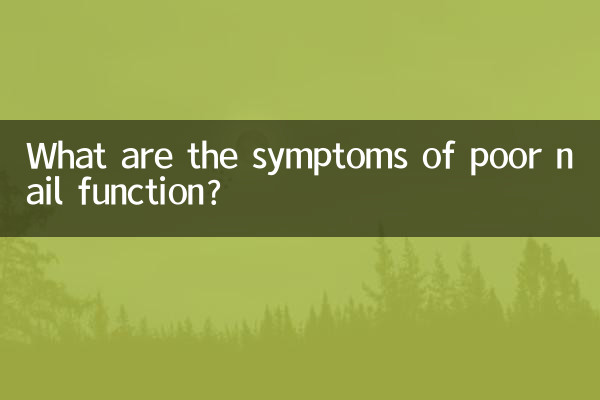What are the symptoms of poor nail function?
The thyroid is an important endocrine organ in the human body, responsible for secreting thyroid hormones and regulating important functions such as metabolism, growth and development. When thyroid function is abnormal, a series of symptoms may occur. Below are common symptoms of abnormal thyroid function (hyperthyroidism or hypothyroidism) and their associated data.
1. Symptoms of hyperthyroidism (hyperthyroidism)

| Symptoms | Description |
|---|---|
| Palpitations | Rapid heartbeat, possibly accompanied by irregular heartbeat |
| weight loss | Increased appetite but significant weight loss |
| Sweating | Sweating easily, especially on hands and feet |
| Hands shaking | Slight tremors in fingers or hands |
| mood swings | Irritability, anxiety, or mood swings |
2. Symptoms of hypothyroidism (hypothyroidism)
| Symptoms | Description |
|---|---|
| fatigue | Continuous feeling of tiredness that doesn’t get better even after resting |
| weight gain | Metabolism slows down, making it easy to gain weight |
| Afraid of cold | Sensitive to low temperatures and easily feel cold |
| dry skin | Rough, dry, or even flaky skin |
| memory loss | Lack of concentration and memory loss |
3. Common causes of thyroid dysfunction
There are many causes of abnormal thyroid function. Here are some common causes:
| Reason | Description |
|---|---|
| autoimmune disease | Such as Graves' disease (hyperthyroidism) or Hashimoto's thyroiditis (hypothyroidism) |
| Abnormal iodine intake | Excess or insufficient iodine may affect thyroid function |
| drug effects | Certain medications may interfere with thyroid hormone synthesis |
| Thyroid surgery or radiation therapy | Functional abnormalities may occur after partial or total removal of the thyroid gland |
4. How to prevent and improve thyroid dysfunction
Although thyroid dysfunction is common, the risk of its occurrence can be reduced through reasonable prevention and conditioning:
| method | Description |
|---|---|
| balanced diet | Ensure adequate intake of iodine and eat foods rich in selenium and zinc |
| Regular physical examination | Early detection of thyroid problems and timely intervention |
| avoid excessive stress | Chronic stress may affect thyroid function |
| Take medication as directed by your doctor | If you have thyroid problems, you need to take medicine as recommended by your doctor |
5. Conclusion
Symptoms of thyroid dysfunction are diverse and can affect every aspect of your life. If you find that you have the above symptoms, it is recommended to seek medical examination in time. With scientific treatment and conditioning, most thyroid problems can be effectively controlled. Maintaining good living habits and regular physical examinations are the keys to preventing thyroid disease.

check the details

check the details